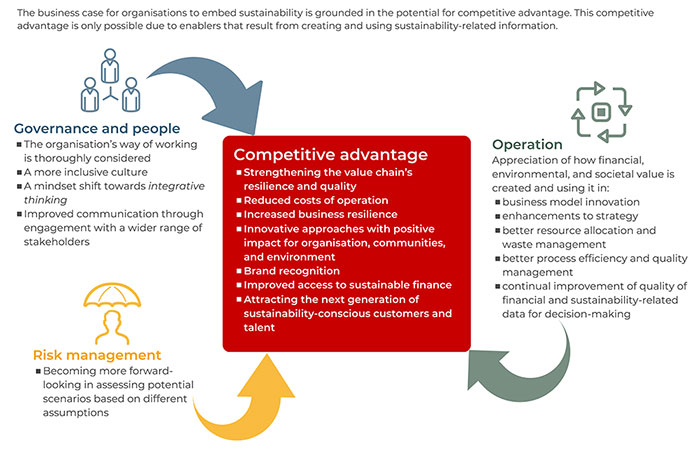Creating and using sustainability-related information supports SMEs to survive and importantly means they can thrive through better business. This report shows how professional accountants are integral to helping SMEs access the enablers to this better business.
All organisations must be ready to provide information related to their approach and progress in managing sustainability-related risks and opportunities. The demand for this information extends beyond the organisation to its value chain and comes from regulators, investors and many other stakeholders. SMEs are in scope because they comprise 90% of all organisations globally, and so are a vital part of the value chain.
The enablers to better business that result from communicating and using sustainability-related information may help SMEs gain new competitive advantage.
Understandably, SMEs may consider these demands burdensome especially at times of significant financial pressure, but evidence suggests the effort is justified. Therefore, we encourage all SMEs to take small first steps and do what’s possible in communicating sustainability-related information with a view of becoming better businesses.
What this guide addresses
This guide outlines the business case and approach for SMEs to create and use sustainability-related information.
The ACCA research team has adapted the eight-stage sustainability reporting cycle in Sustainability Reporting – The Guide to Preparation for use by SMEs. To inspire SMEs new to creating and using sustainability-related information, there are examples and approaches commonly used by SMEs to prepare sustainability-related information.
Engagement with each stage will usually occur in a clockwise order, although at times concurrently with other stages. As a minimum, SMEs focused on fulfilling information requests from their value chains will find Stages 1, 2, 4, 5 and 7 most relevant. Those that invest in all stages will be in a better position to secure competitive advantage.
 Sustainability reporting cycle
Sustainability reporting cycle
Written by Sharon Machado, Aaron Saw
Review the in brief guidance
Revie the 'in brief' guidance provided before engaging with this detailed guidance and sample worksheets that outline the key information to be collected. The worksheets can be used to collect and communicate sustainability information.
"The creation and use of sustainability-related information helps SMEs, their advisers and stakeholders to see and take advantage of their opportunities and manage their risks. This will put SMEs in a much stronger position financially – making it easier to attract investment and obtain preferential terms of trade with suppliers. In the battle for talent, it will help them recruit and retain high-calibre employees. "
Sharon Machado, head of sustainable business, ACCA



